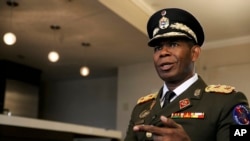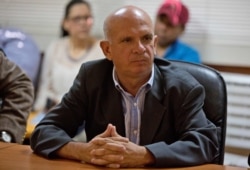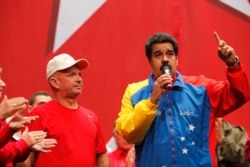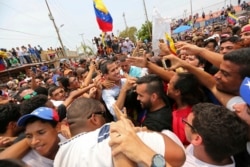Two former ranking generals in Venezuela's security services, now in exile, have been speaking out about what they see as rampant corruption and pervasive Cuban influence in the government of President Nicolas Maduro.
General Manuel Cristopher Figuera and retired general Hugo Carvajal — the former in the United States and the latter in a Spanish jail — have also been talking to reporters about their roles in recent attempts to drive Maduro from power.
The two officers, who at different times headed the main branches of Venezuela’s security apparatus, offer stark views of the government’s inner workings, charging that torture is used “systematically" and that a Cuban security force protects Maduro.
Carvajal has described Maduro as an "unscrupulous kleptomaniac" and both have described his government as the most corrupt in Latin America's history.
The generals are also critical of the latest round of EU-backed talks between the Venezuelan government and the opposition, which the EU has launched in Barbados.
The "European Union should know it's a fraud," said Figuera, adding that "it is useless to negotiate with Maduro."
Figuera, who headed Venezuela’s main internal security service, SEBIN, participated in a rebellion led by the president of the parliament Juan Guaido in April. He ordered the release of opposition leader Leopoldo Lopez from house arrest and signed a letter demanding Maduro’s resignation.
"Many more who were involved in the plan are now too terrified" to come forward, Figuera said in an interview with the Spanish newspaper ABC from Miami.
The general also criticized a recent report by the UNHCR, saying its finding that the Maduro government is to blame for almost 7,000 extrajudicial executions was too "timid."
"The situation in Venezuela is more grim than that reflected the report," Figueres told journalists, saying that SEBIN has become a "center for kidnapping and extortion."
Guaido warned last week of mounting death threats by pro-regime paramilitary squads seeking to force opposition members of parliament into silence or exile. Several of his aides and two of his closest bodyguards have recently been arrested.
Gen. Carvajal, who formerly headed Venezuela’s military counter-intelligence service, DGCIM, and is also a member of parliament, was the only military official to pledge loyalty to Guaido when the opposition leader declared himself acting president and tried to bring in a convoy of humanitarian aid in February.
Carvajal himself faces U.S. charges as a "second-tier kingpin" in a massive cocaine smuggling operation headed by members of Venezuela’s military high command 10 years ago. He was jailed in Spain shortly after his arrival here in March.
Detractors say Carvajal's futile pronouncement of support for Guaido was little more than a bid to gain favor with U.S. President Donald Trump and negotiate a plea bargain.
"My decision was not so that anyone would follow me. It was to fulfill my public duty," Carvajal told the Spanish newspaper El Mundo in an interview.
Evan Ellis, a Latin America analyst at the U.S. Army War College, has said Carvajal’s arrest may have raised fears among Maduro’s top officials that he could reveal sensitive information about them, generating a sense of panic that created conditions for April’s putsch.
Carvajal and Figuera have said the attempted coup failed because the plotters rejected demands from the head of the supreme court, Maikel Moreno, that he be paid $100 million or be assured he would be named president. Another factor was the refusal of Defense Minister Vladimir Padrino to support the coup attempt.
Figuera says Cuban agents helped sustain the loyalty of key military units, estimating that about 15,000 Cubans operate in Venezuela. He says Maduro is surrounded by an elite force of about 200 Cubans that includes highly trained experts in electronic eavesdropping.
Figuera has called on the EU to intervene more directly in Venezuela by sending teams of investigators to gather first-hand information.
Spanish Foreign Minister Josep Borrell, who is slotted to be chief external affairs officer in the newly elected EU Commission, has called for an international investigation into the recent death of navy commander Rafael Acosta while in DGCIM custody.
But he also tweeted that "Maduro has control over the administration, the army and territory. If we want elections it’s necessary to negotiate with him."







